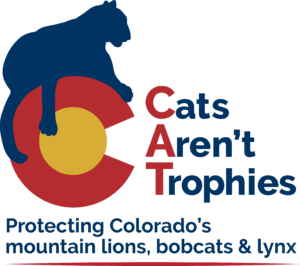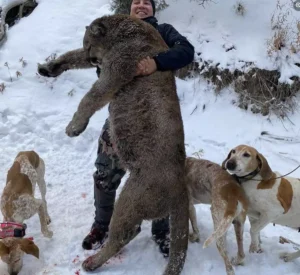PRESS RELEASE


- For Immediate Release:
- Contact:
- Julie Marshall
- 720-255-9831
- Email Julie here
Colorado State University Study, Published Days Ago, Shows Coloradans Overwhelmingly Disapprove of Trophy Hunting and Hounding of Mountain Lions
80% of Coloradans disapprove of killing mountain lions for hides or fur and 88% oppose hounding of native cats
Colorado — According to faculty at Colorado State University studying human dimensions of wildlife, 78% of Coloradans disapprove of trophy hunting of mountain lions, while a staggering 88% oppose the use of dogs in facilitating the hunt. Data from Colorado Parks and Wildlife, for 2022, reveal that 97% of successful lion kills come with the aid of dogs.
The study is titled “Public Perspectives on hunting mountain lions and black bears in Colorado,” by authors Benjamin Ghasemi, Rebecca Niemiec, and Kevin R. Crooks, and was published Aug. 22, 2024, in the Society for Conservation Biology.
The report shows:
- 77.9% of citizens disapprove of hunting mountain lions for trophies
- 80.6% of citizens disapprove of hunting mountain lions for a hide or fur
- 62.7% of citizens disapprove of recreational hunting of mountain lions
- 88.2% of citizens disapprove of hunting mountain lions using dogs

“Understanding public perspectives on wildlife management is critical so that our wildlife agencies can make decisions that reflect the values of their constituents,” stated Dr. Rebecca Niemiec, director of the Animal Human Policy Center at Colorado State University. “We found in a demographically representative survey of the Colorado public that the majority of residents disapproved of hunting mountain lions (and bears) for trophy, hide or fur, and recreation. Additionally, 88% disapprove of hunting mountain lions with dogs. Ensuring that our wildlife policies consider the voices of all Coloradans moving forward is essential.”
This newly published study falls in line with earlier reports about public perceptions on mountain lion trophy hunting, including among hunters who do not hunt mountain lions, all showing the vast general public is not in favor.
A 2022 survey of Colorado residents by Colorado State University researchers showed 67% strongly agreeing with the idea that mountain lions should not be harmed by humans without cause. A large majority said they did not like the idea of using dogs or technological devices to hunt wild cats.
Hounding is Used in 97.3% of ‘Guaranteed’ Mountain Lion Trophy Hunting in Colorado
Colorado Parks and Wildlife’s public data show that of the nearly 500 mountain lions (the yearly average) killed by trophy hunters in the season ending in 2022, 97.3% of those lions were killed using hounding.
Data is based on self-reporting of lion trophy hunters in Colorado.
The percentage could actually be even higher, as there were 13 lions hunted with a blank left on the section of the report for methods used.
Mountain lion trophy hunting outfitters operate in Colorado to offer out of state trophy hunters what they call a “guaranteed” 100% success rate in getting a trophy lion. They use hounds to guarantee it.
Here is a good example by one outfitter operating in Colorado that describes in detail how hounding works, with guaranteed success. Bold faced emphases added for highlighting how this is the definition of trophy hunting with hounds:
Winter Cougar Hunt ’24-25 / Colorado, United States – BookYourHunt.com
“This hunt is conducted with trucks, snowmobiles, and other off highway vehicles. We start our days very early driving roads looking for mountain lion tracks. Once we have a track located, we release hounds and catch your cat.”
“Using GPS technology, we track the hounds and precisely locate where they treed your trophy. We then determine the easiest route to take you into your trophy. Hikes can be very short but can also range 1-2 miles and 750+- feet in elevation. Due to the large area we hunt lodging will vary from hunt to hunt. Most hunts will be based out of our home where clients will have their own private bed, bath and living room area. Weeks where we choose to travel to further hunting areas, lodging will [be] based out of a nice toy hauler RV, or possible motels in the nearest town. Some areas we will stay in a rustic modern cabin with most of the luxuries of home.”
The promotion concludes with the idea that this is a guaranteed kill, and the animal has no chance to escape: “Near 100% opportunity on mature cat”
A Clear Connection to Colorado’s Successful Ballot Measure Protecting Bears from Hounding
In 1992, Colorado voters passed a measure to ban hounding, baiting, and spring hunting of bears with a 70% supermajority. That measure passed in 55 of 63 counties in the state, and a post-election survey revealed that nearly half of licensed hunters in the state supported it.
“If hounding is wrong for bears, it’s wrong for lions and bobcats, too,” said Julie Marshall of Animal Wellness Action, one of the 100 organizations officially endorsing CATs. “Same type of dogs, same shooting of the quarry from a tree, same orphaning of cubs and kittens left without maternal care and soon to die in their dens from dehydration or starvation.”
For More Information
- Full Report: The Society for Conservation Biology (wiley.com)
- Cats Aren’t Trophies: https://catsarenttrophies.org/
- Hounding data, Colorado Parks and Wildlife: CORA-2022-0489-Meyer-Bobcat-and-Lion-Mortalities-Statewide-2021-2022
Animal Wellness Action is a Washington, D.C.-based 501(c)(4) whose mission is to help animals by promoting laws and regulations at federal, state and local levels that forbid cruelty to all animals. The group also works to enforce existing anti-cruelty and wildlife protection laws. Animal Wellness Action believes helping animals helps us all. Twitter: @AWAction_News
Cats Aren’t Trophies (CATs) is a broad and diverse coalition of Coloradans that includes nearly 100 wildlife and other organizations that believes that trophy hunting of mountain lions and bobcats is cruel and unsporting — a highly commercial, high-tech head-hunting exercise that doesn’t produce edible meat or sound wildlife management outcomes, but only orphaned cubs and social chaos among the surviving big cats.